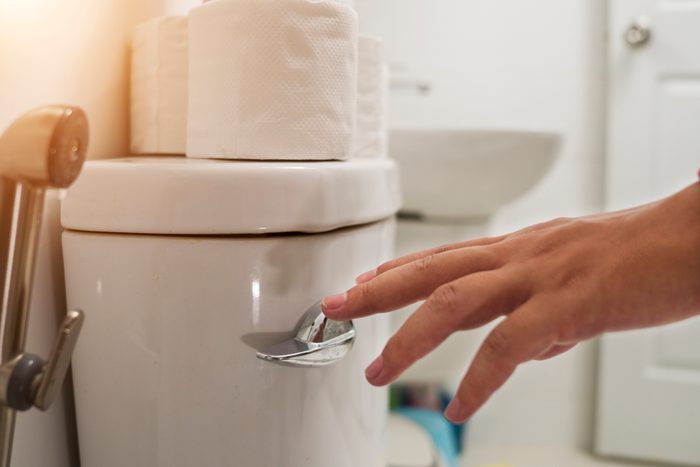Here’s Why Your Poop Won’t Flush, According to Gastro Doctors
Updated: Oct. 17, 2023

A tough-to-flush constitutional is an occasional woe that simply comes with being human. Two doctors reveal when it can signal something more.
Ever try to flush after a #2 but…can’t? You’re not the only one with this poop problem that, sometimes quite literally, won’t go away. (Until you wait a while and try flushing again—or have to break out a plunger.)
Pooping, clinically referred to as “passing stool” or “moving the bowels,” is part of the normal digestive process. A bowel movement is simply how your body removes waste. But when you go and it won’t flush, it can leave you with a few lingering questions. (Not to mention a sense of panic if you’re anywhere other than home!)
“Stool, or poop, that is resistant to a flushing toilet is a common concern for patients,” William Palmer, MD, associate professor of gastroenterology and hepatology at the Mayo Clinic in Jacksonville, FL, tells The Healthy @Reader’s Digest. While this is just one of those unglamorous parts of walking the planet, he adds that if this is your norm, it might be a clue about a health issue: “Though occasional abnormal stools can occur, if bowel movements frequently resist a flush we have to consider causes of intestinal malabsorption that may lead to excess fat in the stool.”
Adds Kenneth Josovitz, MD, a gastroenterologist with Gastro Health in Woodbridge, VA: “Stools can be bulky for a variety of reasons. It may be a result of a large meal, an increase in consumption of water and fiber in your diet or constipation.”
What does it mean if your poop is too big to flush?
Not getting enough fiber, being dehydrated, lack of exercise, and tummy troubles caused by travel are all a few things that can cause large movement that’s hard to pass.
Some medications can also be the culprit, as can underlying medical conditions. These can include diabetes, diverticulitis, hypothyroidism, tumors, or Parkinson’s disease just to name a few, Dr. Josovitz explains.
How High Is Your Colon Cancer Risk? This 1-Minute Quiz Helps You Find Out
Doctors’ reasons that stool won’t flush
If the matter is denser than water, it typically sinks. It can float and be harder to flush if there’s too much fat, fiber, or gas, Dr. Josovitz says.
“Floating stools or difficult to flush stools are usually harmless and most often normalize on their own over time,” he adds.
What Is ‘Stress Poop’? Gastro Doctors Reveal the Science
Why is my poop sticking to the bowl?
Potty that won’t flush isn’t the only issue that can cause a lasting issue. Sometimes, what you deposit gets “stuck” to the toilet bowl. (It’s no wonder the Scrubbing Bubbles Fresh Brush flushable toilet-cleaning kit gets thousands of five-star reviews on Amazon—you get a fresh brush for every scrub, and flushing the brush after use makes it better for the planet than other disposable toilet scrubbers!)
Dr. Palmer says you may see visible droplets in the water or poop that sticks to the toilet. That commonly occurs in people who have a condition related to the digestive system, such as celiac disease, small intestinal bacterial overgrowth, an intolerance for lactose or dairy, or pancreatic disease.
Dr. Palmer says doctors use something called the Bristol stool chart to classify. If you visit the doc, expect to hear about it. You can also use it to give your doctor a better idea of what you’re seeing.
When to be concerned about poop that won’t flush
If your stools are consistently floating, greasy and smelling really strong, it may be a sign of an underlying malabsorption disorder—meaning your body is not absorbing nutrients, like fat or carbohydrate malabsorption which can be caused by lactose intolerance, gastrointestinal infection (giardia), or pancreatic disease (pancreatic insufficiency and pancreatic cancer).
Call your doctor if those problems persist, if your bowel patterns change (like you start having diarrhea or constipation regularly), if you lose weight, have stomach pain, if your poop looks too dark or too light, or if your urine gets really dark in color, Dr. Josovitz suggests.
The verdict on unflushables
Overall, a hard-to-flush poop is often nothing to worry about. Definitely pay attention to your patterns, though. “The occasional sticky or flush-resistant stool can happen with certain dietary misadventures,” Dr. Palmer says, “but recurrent or continued symptoms with associated bleeding, weight loss or other symptoms should be evaluated by a gastroenterology specialist.”
- New Study: Here’s How Often You Should Poop To Reduce Your Alzheimer’s Risk
- Here’s Why Pee Smells the Way It Does, According to a Urology and Kidney Doctor
- New Study: Here’s What Happens to Your Heart on a Hot Day
- The 5 Health Benefits of Rollerblading You Probably Didn’t Know, Inspired by Barbie
- Feeling This Emotion Too Often Can Lead to Premature Death, Says New Study




















